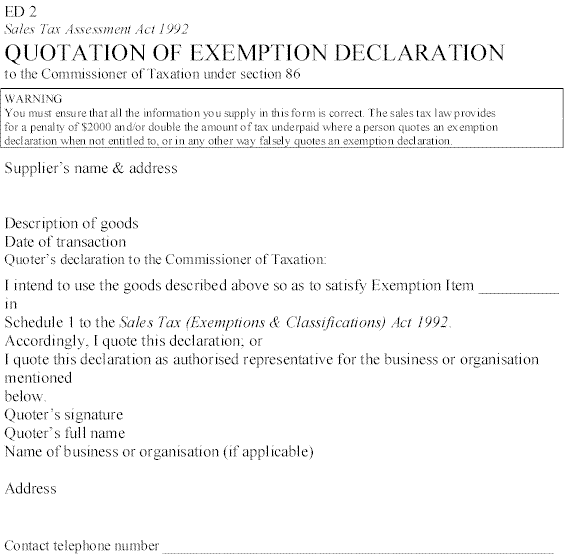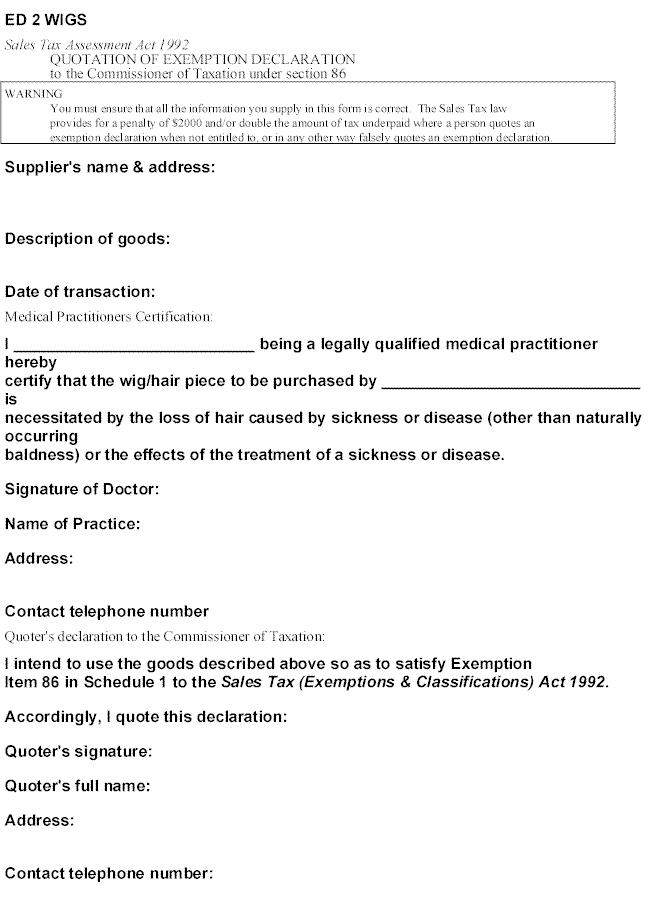Sales Tax Bulletin - No. 4
STB 4
Goods for use by people with disabilities-
This document has been Withdrawn.View the Withdrawal notice for this document.
Date of Issue: 1 March 1997
Valid from 1 March 1997
| Produced by the Withholding & Indirect Taxes Program of the Australian Taxation Office. |
About this bulletin
This bulletin explains how the sales tax law affects goods that are commonly used by people with disabilities. It is a public ruling for the purposes of section 77 of the Sales Tax Assessment Act 1992 and may be relied upon by any person to whom it applies. It replaces any previous private or public rulings, if they are inconsistent with the bulletin, and is current as at 1 March 1997.
If, after reading this bulletin, you need more information about how the sales tax law affects you, contact the Tax Office on 13 28 66 for the cost of a local call.
What is sales tax?
Sales tax is a tax paid on goods manufactured or imported into Australia. It is generally paid when the goods are sold by a manufacturer or wholesaler to a retailer and is only paid once.
Some goods don't include sales tax in their price. These are known as always-exempt goods and include most foodstuffs, medicines and surgical goods, building materials, clothing, books, magazines, periodicals and newspapers.
In special circumstances a person with a disability may claim exemption on goods that normally have sales tax included in their price.
Are there any goods that are always exempt from sales tax?
Goods designed and manufactured expressly for use by people suffering from sickness, disease or disablement will be always-exempt goods provided they are not of a kind ordinarily used by people who do not suffer from sickness, disease or disablement.
The following lists include always-exempt goods commonly used by people with disabilities. Always-exempt goods are sold free of sales tax to everybody. You do not need to do anything to buy these goods free of sales tax.
Vision impaired people
- • braille watches and clocks;
- • braille writing frames and styles;
- • talking book machines (and parts) specially designed for the vision impaired;
- • enlarged text computer monitors for vision impaired people;
- • spectacles and eyeglasses;
- • artificial eyes;
- • ultrasonic sensing devices designed for use by vision impaired people; and
- • viewscan apparatus designed for use by vision impaired people.
Hearing impaired people
- • visual display units designed for people with hearing and/or speech impairment to communicate with other people;
- • telephone communication devices designed to allow hearing impaired people to send and receive messages by telephone; and
- • batteries designed specifically for use with hearing aids.
Physically impaired people
- • wheelchairs and motorised wheelchairs, wheeled beds and electrically operated therapeutic lounge/recliner chairs specifically designed for disabled people;
- • walking sticks designed for disabled people;
- • self help medical and surgical appliances such as asthma inhalers;
- • artificial limbs;
- • surgical boots, braces and irons;
- • van lift (a hydraulic lifting device for lifting disabled people into a vehicle); and
- • stair-aid apparatus designed for carrying disabled people in wheelchairs up or down stairs.
Other goods exempt for people with disabilities
Exemption may also be claimed on goods that normally include sales tax. These goods are conditionally exempt, the condition being that the particular requirements of an Item in Schedule 1 to the Sales Tax (Exemptions and Classifications) Act 1992 are satisfied.
Conditionally exempt goods that may be bought free of sales tax include the following:
Teletext devices
People who are profoundly deaf are entitled to sales tax exemption on videotext, teletext and other similar decoding devices used with television receivers (provided the goods are for their own use).
To obtain exemption a person must be certified as profoundly deaf by the Commonwealth Department of Health and Family Services (or their representative). Application forms for exemption under Item 95 are available from the Commonwealth Department of Health and Family Services.
Battery chargers for wheelchairs
Battery chargers used mainly to recharge batteries for wheelchairs are exempt under Item 94(3). Exemption under Item 94(3) can be obtained by providing the supplier of the goods with a completed exemption declaration (ED2). A blank copy of the declaration is on page 5.
Modification goods for motor vehicles
Goods for use mainly in modifying a motor vehicle to adapt it for:
- • driving by a person who has a physical impairment; or
- • transporting a person who has a physical impairment
are exempt under Item 98.
This exemption applies to the owner of a vehicle as well as to motor vehicle body or repair shops, providing the goods are mainly for use in modifying vehicles for disabled people. Exemption under Item 98 can be obtained by providing the supplier of the goods with a completed exemption declaration (ED2). A blank copy of the declaration is on page 5.
Wigs and hair pieces
Wigs and hair pieces for use by people who require them due to hair loss caused by sickness or disease (other than naturally occurring baldness), or the effects of the treatment of a sickness or disease may be obtained tax free under Item 86.
To qualify for exemption under Item 86 a legally qualified medical practitioner must firstly certify that a person needs a wig or hair piece for medical reasons. To obtain exemption the ED2 (Wigs) on page 6 should be completed and given to the wig or hair piece supplier.
How long must conditionally exempt goods be used?
Goods bought free of sales tax for use by people with disabilities must be intended to be used for a period of two years, or for the useful life of the goods, whichever occurs first.
Some exemption items in the sales tax legislation require goods to be used mainly for a particular purpose.
Goods described on pages 1 and 2 under the heading 'Are there any goods that are always exempt from sales tax?' do not have to be used for two years.
How do I claim exemption?
When ordering goods by telephone you must indicate to the supplier that you wish to buy the goods free of sales tax, and inform them of the Item number that entitles you to exemption.
This verbal quotation must be followed up with a written exemption declaration form within a reasonable period, usually at or before the time of the sale but no later than when the account is paid. Copies of exemption declarations are on pages 5 and 6 of this bulletin.
Exemption declaration forms are retained by the supplier of the goods in their records.
Important: If the quotation is not made in the manner stated above, the supplier must charge you the sales tax.
What about motor vehicles?
Disabled veterans
A person who as a result of serving in the Defence Force or any other armed force of Her Majesty:
- • has lost a leg or both arms, or has a leg or both arms which are permanently and completely useless; or
- • is a veteran who receives a pension under section 24 of the Veterans' Entitlements Act 1986, also known as the totally and permanently incapacitated (TPI) pension,
is entitled to sales tax exemption under Item 96 on a motor vehicle (and spare parts for that vehicle) provided it is for their own use.
To obtain an exemption declaration for a motor vehicle, or spare parts, under Item 96 contact the nearest office of the Department of Veteran Affairs.
Disabled people in the workforce
Sales tax exemption on a motor vehicle is available under Item 97 for a person who has:
- • lost the use of one or more limbs and the Commonwealth Department of Health and Family Services has certified that the disability prevents them from using public transport; and
- • the motor vehicle being bought is for use in travelling to and from their place of gainful employment.
A motor vehicle bought free of sales tax must be intended to be kept for a minimum of two years or until it has travelled 40,000 kms. Sales tax exemption is also available on spare parts for a motor vehicle bought free of sales tax.
Further information about Item 97 exemption, forms for the medical examination, or application forms can be obtained from your local Tax Office.
Luxury Vehicles
The sales tax law imposes a limit on the amount of sales tax exemption available on luxury vehicles. People entitled to exemption under Item 96 or Item 97 must pay sales tax on that part of the taxable value above the luxury vehicle threshold. The threshold is 67.1% of the motor vehicle depreciation limit for the current financial year. Your motor vehicle dealer will be able to advise you of the amount of sales tax exemption available on a particular vehicle.
Do you need more information?
If you have any questions or need more help, contact your local Tax Office:
- • by phone - on our national sales tax enquiry number, 13 28 66. You can phone this number from anywhere in Australia for the cost of a local call; or
- • in person - at the enquiry counter of your local Tax Office. Addresses for your local Tax Office are listed in TaxPack, as well as in the White Pages telephone directory.1


ATO references:
NO NAT.1691.03.97
